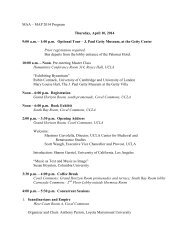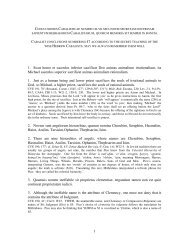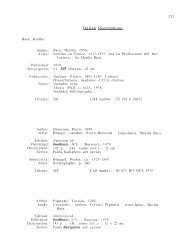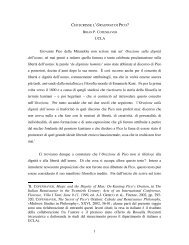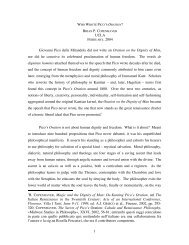Manifesto of the Fascist Intellectuals
Manifesto of the Fascist Intellectuals
Manifesto of the Fascist Intellectuals
You also want an ePaper? Increase the reach of your titles
YUMPU automatically turns print PDFs into web optimized ePapers that Google loves.
MANIFESTO OF THE FASCIST INTELLECTUALS<br />
Origins<br />
Fascism is a recent movement and an ancient movement <strong>of</strong> <strong>the</strong> Italian spirit, deeply<br />
bound up with <strong>the</strong> history <strong>of</strong> <strong>the</strong> Italian nation, though not without meaning and interest<br />
for all o<strong>the</strong>r nations. Its origins go back to about 1919 when a band <strong>of</strong> men, returned<br />
from <strong>the</strong> trenches and resolved to fight vigorously against <strong>the</strong> demo-socialist politics that<br />
<strong>the</strong>n prevailed, ga<strong>the</strong>red around Benito Mussolini. The o<strong>the</strong>r politicians saw only <strong>the</strong><br />
immediate material effects <strong>of</strong> <strong>the</strong> Great War from which <strong>the</strong> Italian people had emerged<br />
victorious but exhausted. If <strong>the</strong>y did not openly deny its moral value, <strong>the</strong>y let it go to<br />
waste by representing it to <strong>the</strong> Italians, from a petty individualist and utilitarian point <strong>of</strong><br />
view, as a tally <strong>of</strong> sacrifices for which each person had to be compensated in proportion<br />
to <strong>the</strong> damage suffered. The result was a presumptuous and threatening opposition <strong>of</strong><br />
private interests to <strong>the</strong> State, a disregard for its authority, a loss <strong>of</strong> prestige for <strong>the</strong> King<br />
and <strong>the</strong> Army – symbols <strong>of</strong> <strong>the</strong> nation at a level higher than individuals and <strong>the</strong> various<br />
categories <strong>of</strong> citizens – an unleashing <strong>of</strong> passions and baser instincts, an inciting <strong>of</strong> social<br />
fragmentation, <strong>of</strong> moral decadence, <strong>of</strong> a selfish and irresponsible spirit <strong>of</strong> rebellion<br />
against all law and discipline.<br />
The individual against <strong>the</strong> state – an expression typical <strong>of</strong> <strong>the</strong> political side <strong>of</strong> <strong>the</strong> spiritual<br />
corruption that could not abide any higher norm for human life which might vigorously<br />
rule and constrain <strong>the</strong> attitudes and thoughts <strong>of</strong> individuals. In its origins, however,<br />
Fascism was a political and a moral movement. Its politics was like a gymnasium <strong>of</strong> selfdenial,<br />
a campaign for <strong>the</strong> sacrifice <strong>of</strong> <strong>the</strong> individual to an idea in which <strong>the</strong> individual<br />
might find his life’s purpose, his freedom and his entire law – <strong>the</strong> idea which is <strong>the</strong><br />
Fa<strong>the</strong>rland, an ideal which is realized historically without ever being exhausted, a specific<br />
and well-defined historical tradition <strong>of</strong> civilization, but a tradition that never remains in<br />
<strong>the</strong> past as a dead memory but becomes a personal force in <strong>the</strong> citizen’s mind, aware that<br />
<strong>the</strong>re is a goal to attain, a tradition which is <strong>the</strong>refore a mission.<br />
Fascism and <strong>the</strong> State<br />
This is <strong>the</strong> source <strong>of</strong> <strong>the</strong> religious character <strong>of</strong> Fascism.<br />
Its religious and <strong>the</strong>refore intransigent character explains <strong>the</strong> method that Fascism used in<br />
its struggle during <strong>the</strong> four years from 1919 to 1922. <strong>Fascist</strong>s were a minority in <strong>the</strong><br />
country and in Parliament, where a small, core group arrived after <strong>the</strong> elections <strong>of</strong> 1921.<br />
The constitutional State was <strong>the</strong>refore anti-<strong>Fascist</strong>, as it had to be, since it was <strong>the</strong> State<br />
<strong>of</strong> <strong>the</strong> majority, and it was precisely this State that called itself liberal which stood<br />
opposed to Fascism.<br />
The State was liberal, but its liberalism was <strong>the</strong> agnostic and acquiescent kind that<br />
understands only external freedom – <strong>the</strong> State which is liberal because it remains outside<br />
<strong>the</strong> free citizen’s mind as if it were a mechanical system apart from <strong>the</strong> activity <strong>of</strong> each<br />
individual. Although <strong>the</strong> representatives <strong>of</strong> hybrid socialism – democratic and
parliamentary – had adapted <strong>the</strong>mselves, even in Italy, to this individualist version <strong>of</strong> <strong>the</strong><br />
idea <strong>of</strong> politics, this State was plainly not what socialists yearned for. Nor was it <strong>the</strong><br />
State whose idea had worked so forcefully in <strong>the</strong> heroic Italian era <strong>of</strong> our Risorgimento,<br />
when <strong>the</strong> State rose out <strong>the</strong> work <strong>of</strong> a small minority streng<strong>the</strong>ned by <strong>the</strong> power <strong>of</strong> an<br />
idea to which individuals yielded in various ways: its basis was <strong>the</strong> great project <strong>of</strong><br />
making people who had gained <strong>the</strong>ir independence and unity into Italians.<br />
Embattled against this State, Fascism took strength from its idea, which attracted a<br />
rapidly growing number <strong>of</strong> <strong>the</strong> young because <strong>of</strong> <strong>the</strong> fascination that comes from any<br />
religious idea that calls for sacrifice. It became <strong>the</strong> party <strong>of</strong> <strong>the</strong> young – just as Mazzini’s<br />
Young Italy grew out <strong>of</strong> a similar political and moral need after <strong>the</strong> events <strong>of</strong> 1831.<br />
That party also had its Hymn <strong>of</strong> Youth, which <strong>Fascist</strong>s sing joyously from an exultant<br />
heart.<br />
And like Mazzini’s Young Italy, Fascism became <strong>the</strong> faith <strong>of</strong> all Italians who were<br />
<strong>of</strong>fended by <strong>the</strong> past and eager for renewal. A faith, like any faith in collision with a<br />
reality, which comes from breaking up and melting in <strong>the</strong> crucible <strong>of</strong> new energies and<br />
being reshaped in keeping with <strong>the</strong> new ideal, ardent and intransigent.<br />
It was <strong>the</strong> same faith that ripened in <strong>the</strong> trenches and in a deep change <strong>of</strong> heart about <strong>the</strong><br />
sacrifice <strong>of</strong>fered on <strong>the</strong> battlefields for <strong>the</strong> only purpose that could justify it – <strong>the</strong> life and<br />
greatness <strong>of</strong> <strong>the</strong> Fa<strong>the</strong>rland – a faith <strong>of</strong> energy and violence, disinclined to respect<br />
anything that opposed <strong>the</strong> life and greatness <strong>of</strong> <strong>the</strong> Fa<strong>the</strong>rland.<br />
Thus arose <strong>the</strong> squadrons, a young people’s movement that was resolute and armed.<br />
They wore black shirts and organized <strong>the</strong>mselves militarily, breaking <strong>the</strong> law in order to<br />
set up a new law, a force armed against <strong>the</strong> State to establish <strong>the</strong> new State.<br />
The squadrons moved against <strong>the</strong> fragmented anti-nationalist forces whose activity<br />
culminated in <strong>the</strong> general strike <strong>of</strong> July, 1922, and finally risked an uprising on October<br />
28, 1922, when armed columns <strong>of</strong> <strong>Fascist</strong>s marched on Rome after occupying public<br />
buildings in <strong>the</strong> provinces. Some died in <strong>the</strong> March on Rome, before and after it reached<br />
its goal, especially in <strong>the</strong> Po Valley. Like all bold actions with deep moral content, <strong>the</strong><br />
March ended first with amazement, <strong>the</strong>n admiration and at last with universal acclaim. It<br />
thus seemed that at one stroke <strong>the</strong> Italian people had rediscovered <strong>the</strong>ir enthusiastic pre-<br />
War unanimity, yet this feeling was even more vibrant because people realized that<br />
victory had been won and that a new, refreshing wave <strong>of</strong> faith had come to revitalize <strong>the</strong><br />
victorious nation on its hard new path toward <strong>the</strong> urgent restoration <strong>of</strong> its financial and<br />
moral strength.<br />
<strong>Fascist</strong> Government<br />
The squadrons and <strong>the</strong> law-breaking stopped, and Fascism outlined <strong>the</strong> elements <strong>of</strong> <strong>the</strong><br />
regime that it wished to see. Between October 29 and 30, <strong>the</strong> fifty thousand blackshirts<br />
who had marched on <strong>the</strong> capital from <strong>the</strong> provinces left Rome in perfect order. They left
after parading before His Majesty <strong>the</strong> King, and <strong>the</strong>y left at a sign from <strong>the</strong> Duce, who<br />
became <strong>the</strong> head <strong>of</strong> Government and <strong>the</strong> soul <strong>of</strong> <strong>the</strong> new Italy that Fascism hoped for.<br />
Was <strong>the</strong> revolution over? In a sense, yes: <strong>the</strong> squadrons no longer had a reason to exist.<br />
The Voluntary Militia for National Security was formed to incorporate former squadron<br />
members into <strong>the</strong> State’s armed forces. But <strong>the</strong> State is not <strong>the</strong> Government and <strong>the</strong><br />
Government was still waiting, amidst <strong>the</strong> consensus <strong>of</strong> <strong>the</strong> great majority <strong>of</strong> Italians that<br />
<strong>the</strong>y saw Fascism as <strong>the</strong> most potent political force, <strong>the</strong> one capable <strong>of</strong> expressing all <strong>the</strong><br />
strength <strong>of</strong> <strong>the</strong> nation’s heart and giving it <strong>the</strong> discipline for <strong>the</strong> change in legislation that<br />
<strong>the</strong> State now needed to find <strong>the</strong> form best suited to <strong>the</strong> social trends and spiritual needs<br />
<strong>of</strong> <strong>the</strong> Italian people.<br />
This transformation goes on gradually in <strong>the</strong> midst <strong>of</strong> perfect public order, under a strict<br />
financial regime which has put <strong>the</strong> unstable post-War budget back in balance by<br />
reorganizing <strong>the</strong> army, <strong>the</strong> judiciary and <strong>the</strong> educational institutions without wobbling or<br />
wavering, even while <strong>the</strong>re has been, and still is, plenty <strong>of</strong> vacillation in public opinion,<br />
an opinion violently agitated by a public press whose rigidified opposition becomes all<br />
<strong>the</strong> more furious as it grows more hopeless about any possibility <strong>of</strong> returning to <strong>the</strong> past.<br />
The press takes advantage <strong>of</strong> every mistake and every accident to stir <strong>the</strong> people up<br />
against <strong>the</strong> difficult, constructive and unrelenting work <strong>of</strong> <strong>the</strong> new Government.<br />
But foreigners coming to Italy have crossed <strong>the</strong> ring <strong>of</strong> flame drawn around <strong>Fascist</strong> Italy<br />
by <strong>the</strong> defensive fire <strong>of</strong> ferocious propaganda, written and spoken, internal and external,<br />
from Italians and non-Italians, which has tried to isolate <strong>Fascist</strong> Italy by slandering it as a<br />
country fallen into <strong>the</strong> hands <strong>of</strong> <strong>the</strong> most violent and cynical power. As foreigners have<br />
been able to see this Italy with <strong>the</strong>ir own eyes and as <strong>the</strong>y listen with <strong>the</strong>ir own ears to <strong>the</strong><br />
new Italians living <strong>the</strong>ir material and moral lives, <strong>the</strong>y have come to envy <strong>the</strong> public<br />
order that prevails today in Italy. They have become interested in <strong>the</strong> spirit that strives<br />
every day to gain more mastery <strong>of</strong> this well-regulated mechanism, and <strong>the</strong>y have begun<br />
to sense that here beats a heart, one full <strong>of</strong> humanity even if agitated by <strong>the</strong> frustrations <strong>of</strong><br />
patriotic passion. The Fa<strong>the</strong>rland <strong>of</strong> <strong>the</strong> <strong>Fascist</strong> is also <strong>the</strong> Fa<strong>the</strong>rland that lives and<br />
moves in <strong>the</strong> heart <strong>of</strong> every civic person, <strong>the</strong> Fa<strong>the</strong>rland that stirred feelings everywhere<br />
in <strong>the</strong> tragedy <strong>of</strong> <strong>the</strong> War and now stands vigilant in every region – must stand vigilant to<br />
protect its sacred interests even after <strong>the</strong> War, indeed, as consequence <strong>of</strong> <strong>the</strong> War that no<br />
one any longer believes to be <strong>the</strong> last.<br />
This Fa<strong>the</strong>rland, moreover, is a reconsecration <strong>of</strong> traditions and institutions that endure in<br />
civilization, in <strong>the</strong> flux and perpetuity <strong>of</strong> tradition. It is also a school for <strong>the</strong><br />
subordination <strong>of</strong> <strong>the</strong> particular and inferior to <strong>the</strong> universal and immortal. It is respect for<br />
law and discipline. It is freedom, but freedom to be won through law, freedom<br />
established by renouncing all petty willfulness and wasteful, irrational ambition. It is an<br />
austere conception <strong>of</strong> life and a religious gravity that does not paint grand ideals by<br />
banishing <strong>the</strong>m from this world, where <strong>the</strong> hard work <strong>of</strong> making life ideal goes on by<br />
expressing one’s own convictions in action and in words. These words <strong>the</strong>mselves are<br />
actions that bind <strong>the</strong> person who speaks <strong>the</strong>m, and with him <strong>the</strong>y also bind <strong>the</strong> world <strong>of</strong>
which he is a living, responsible part at every moment <strong>of</strong> time, in every secret that <strong>the</strong><br />
mind brea<strong>the</strong>s.<br />
This ideal is an ideal, but it is an ideal for which a struggle goes on in Italy today, those<br />
very harsh conflicts that show how serious things are and that <strong>the</strong>re is a faith in people’s<br />
hearts. Fascism, like any <strong>of</strong> <strong>the</strong> great movements, grows stronger as it becomes more<br />
able to attract and absorb, more effective and engaged in <strong>the</strong> workings <strong>of</strong> minds, ideas,<br />
interests and institutions – briefly, in <strong>the</strong> living fabric <strong>of</strong> <strong>the</strong> Italian people. And so <strong>the</strong><br />
point is no longer to count and weigh each person but to look to <strong>the</strong> idea and to value <strong>the</strong><br />
idea which, like any true or living idea, is endowed with a power <strong>of</strong> its own and has been<br />
made not by human beings but for <strong>the</strong>m.
MANIFESTO OF THE ANTI-FASCIST INTELLECTUALS: A REPLY BY ITALIAN AUTHORS,<br />
PROFESSORS AND JOURNALISTS TO THE MANIFESTO OF THE FASCIST INTELLECTUALS<br />
<strong>Fascist</strong> intellectuals meeting in Bologna have addressed a manifesto to intellectuals <strong>of</strong> all<br />
nations in order to explain and defend <strong>the</strong> policies <strong>of</strong> <strong>the</strong> <strong>Fascist</strong> party to <strong>the</strong>m. In setting<br />
out on so great an enterprise, <strong>the</strong>se eager gentlemen must not have recollected a similar<br />
and celebrated manifesto announced to <strong>the</strong> world by German intellectuals at <strong>the</strong> start <strong>of</strong><br />
<strong>the</strong> War in Europe – a manifesto greeted by universal disapproval at <strong>the</strong> time and later<br />
considered a mistake by <strong>the</strong> Germans <strong>the</strong>mselves.<br />
<strong>Intellectuals</strong>, students <strong>of</strong> art and science, exercise <strong>the</strong>ir rights and do <strong>the</strong>ir duty when <strong>the</strong>y<br />
join a party and serve it faithfully. But as intellectuals <strong>the</strong>ir sole duty is to use <strong>the</strong> work<br />
<strong>of</strong> research and criticism to elevate all people and all parties alike to a higher spiritual<br />
level so that <strong>the</strong>y can fight <strong>the</strong> battles that <strong>the</strong>y must with ever more positive results. To<br />
breach <strong>the</strong>se boundaries <strong>of</strong> <strong>the</strong> <strong>of</strong>fice assigned to <strong>the</strong>m, to contaminate politics and<br />
literature, politics and science, is an error that can scarcely be called munificent when, as<br />
in this case, it happens by encouraging deplorable acts <strong>of</strong> violence and insolence and by<br />
suppressing freedom <strong>of</strong> <strong>the</strong> press.<br />
And this action taken by <strong>the</strong> <strong>Fascist</strong> intellectuals does not even respond with much<br />
sensitivity to <strong>the</strong> Fa<strong>the</strong>rland, for it is not right to submit <strong>the</strong> Fa<strong>the</strong>rland’s troubles to <strong>the</strong><br />
judgment <strong>of</strong> foreigners, who do not take <strong>the</strong> trouble (naturally, as it happens) to look<br />
beyond <strong>the</strong> various special political interests <strong>of</strong> <strong>the</strong>ir own nations.<br />
In substance what <strong>the</strong>y write is a piece <strong>of</strong> half-baked schoolwork where one finds<br />
intellectual confusions and ill-spun arguments at every point – trading <strong>the</strong> atomism <strong>of</strong><br />
certain types <strong>of</strong> nineteenth century political science, for example, for nineteenth century<br />
liberalism, treating anti-historical, abstract and ma<strong>the</strong>matical democratism, in o<strong>the</strong>r<br />
words, as equivalent to <strong>the</strong> highly historical notion <strong>of</strong> free competition and alternation <strong>of</strong><br />
parties in power, whereby one makes progress, as if in small doses [quasi graduandolo],<br />
thanks to <strong>the</strong> opposition. Ano<strong>the</strong>r example is <strong>the</strong> facile and fevered rhetoric that<br />
celebrates <strong>the</strong> individual’s dutiful submission to <strong>the</strong> whole, as if that were <strong>the</strong> issue,<br />
ra<strong>the</strong>r than <strong>the</strong> capacity <strong>of</strong> authoritarian structures to guarantee <strong>the</strong> most effective moral<br />
advancement. Or ano<strong>the</strong>r, where we are betrayed [si perfidia] by a calamitous inability to<br />
distinguish economic institutions like unions from ethical institutions like legislative<br />
assemblies, thus courting <strong>the</strong> combining – or ra<strong>the</strong>r, <strong>the</strong> miscegenation – <strong>of</strong> <strong>the</strong> two types,<br />
which would end in <strong>the</strong>ir mutual corruption or, at least, <strong>the</strong>ir mutual obstruction. And we<br />
leave aside <strong>the</strong> arbitrary interpretations and manipulations <strong>of</strong> history, which are by now<br />
well-known.<br />
But <strong>the</strong> violence done by this piece to ideas and history counts for little in comparison to<br />
<strong>the</strong> abuse <strong>of</strong> <strong>the</strong> word “religion.” As <strong>the</strong> leading <strong>Fascist</strong> intellectuals understand things,<br />
we should now have found joy in a war <strong>of</strong> religion, in <strong>the</strong> exploits <strong>of</strong> a new evangel or a<br />
new apostolate against an old superstition, resisting to <strong>the</strong> death what dominates it and to<br />
which it still has to bow [alla quale dovrà piegarsi] – and <strong>the</strong>y take this to be proven by<br />
<strong>the</strong> hatred and spite that now makes Italians rage against Italians as never before. This is
what <strong>the</strong>y are calling a disagreement about religion: <strong>the</strong> hatred and spite provoked by a<br />
party which denies that elements <strong>of</strong> o<strong>the</strong>r parties are Italian and insults <strong>the</strong>m as<br />
foreigners, by that very act making itself a foreigner and oppressor in <strong>the</strong> eyes <strong>of</strong> <strong>the</strong><br />
o<strong>the</strong>rs and <strong>the</strong>reby introducing into <strong>the</strong> life <strong>of</strong> <strong>the</strong> Fa<strong>the</strong>rland <strong>the</strong> feelings and habits that<br />
go along with such conflicts. Using <strong>the</strong> word ‘religion’ to dignify <strong>the</strong> suspicion and<br />
animosity which has been sown everywhere, which has deprived even university students<br />
<strong>of</strong> <strong>the</strong> trusting sense <strong>of</strong> bro<strong>the</strong>rhood that <strong>the</strong>y used to have when <strong>the</strong>y shared youthful<br />
ideals, turning <strong>the</strong>m against one ano<strong>the</strong>r in fake clashes – to tell <strong>the</strong> truth, this sounds like<br />
a ra<strong>the</strong>r sorry joke.<br />
Whatever <strong>the</strong> new evangel might be, <strong>the</strong> new religion, <strong>the</strong> new faith, one cannot tell from<br />
<strong>the</strong> text <strong>of</strong> this wordy manifesto. As a practical matter, however, what its mute eloquence<br />
reveals to an objective observer is a bizarre and incoherent blend <strong>of</strong> appeals to authority<br />
and demagoguery; a pr<strong>of</strong>ession <strong>of</strong> reverence for <strong>the</strong> law and violation <strong>of</strong> <strong>the</strong> laws; ultramodern<br />
ideas and musty old notions; absolutist attitudes and Bolshevik dispositions;<br />
flattery for <strong>the</strong> Catholic Church and denials <strong>of</strong> belief; a dread <strong>of</strong> culture and sterile starts<br />
at a culture deprived <strong>of</strong> its premisses; mystical mawkishness and cynicism. And even if<br />
<strong>the</strong>re were any plausible proposals for <strong>the</strong> present government to enact or undertake,<br />
<strong>the</strong>re is nothing in <strong>the</strong>m to brag about, no innovative product to identify a new political<br />
system that would be named ‘Fascism.’<br />
For this chaotic and incomprehensible religion, <strong>the</strong>n, we are not inclined to abandon our<br />
old faith, <strong>the</strong> faith that for two and a half centuries has been <strong>the</strong> soul <strong>of</strong> a resurgent Italy<br />
and a modern Italy, <strong>the</strong> faith whose ingredients are love <strong>of</strong> truth; hope for justice; a<br />
generous human and civic sense; zeal for intellectual and moral education; and eagerness<br />
for freedom, which is <strong>the</strong> strength and security on which all progress depends. When we<br />
look back at images <strong>of</strong> <strong>the</strong> people <strong>of</strong> <strong>the</strong> Risorgimento, those who labored, suffered and<br />
died for Italy, <strong>the</strong>ir faces seem angry and upset at <strong>the</strong> words that are said and <strong>the</strong> things<br />
that are done by our Italian adversaries, and because we are steadfast in <strong>the</strong>ir cause we<br />
take <strong>the</strong> warnings seriously. Our faith is no abstract, artificial contrivance, no mental<br />
obsession caused by <strong>the</strong>ories poorly supported or poorly understood. It is <strong>the</strong> possession<br />
<strong>of</strong> a tradition which has become an emotional disposition and an intellectual or moral<br />
structure.<br />
In <strong>the</strong>ir manifesto <strong>the</strong> <strong>Fascist</strong> intellectuals repeat <strong>the</strong> hackneyed phrase that Italy’s<br />
Risorgimento was <strong>the</strong> work <strong>of</strong> a minority, not mentioning <strong>the</strong> weakness <strong>of</strong> our political<br />
and social makeup on this very point. Indeed, it almost seems that <strong>the</strong>y take satisfaction<br />
when most citizens <strong>of</strong> Italy today, faced with disagreements between Fascism and its<br />
opponents, seem to be indifferent – at <strong>the</strong> least. Liberals have never been satisfied with<br />
such a thing, and <strong>the</strong>y have tried with all <strong>the</strong>ir power to have an ever-growing number <strong>of</strong><br />
Italians called to public life. This was <strong>the</strong> main reason for some <strong>of</strong> <strong>the</strong>ir most<br />
controversial actions, such as <strong>the</strong> granting <strong>of</strong> universal suffrage. Even <strong>the</strong> sympathy with<br />
which many Liberals greeted <strong>the</strong> <strong>Fascist</strong> movement in its early days implied, among o<strong>the</strong>r<br />
things, <strong>the</strong> hope that it would introduce fresh new forces into political life, forces <strong>of</strong><br />
renewal and (why not?) forces <strong>of</strong> conservation. But <strong>the</strong>y never considered keeping <strong>the</strong><br />
bulk <strong>of</strong> <strong>the</strong> nation inert and indifferent, buying <strong>the</strong>m <strong>of</strong>f with various material goods.
They knew that doing so would have betrayed <strong>the</strong> purposes <strong>of</strong> <strong>the</strong> Italian Risorgimento<br />
and would have restored <strong>the</strong> evil devices <strong>of</strong> absolute and quietist governments.<br />
Even now, nei<strong>the</strong>r this putative indifference and inertia nor <strong>the</strong> obstacles that block <strong>the</strong><br />
path to freedom lead us to despair or resignation. What matters is to know that what one<br />
wants and should want is something intrinsically good. The present political struggle in<br />
Italy, because it presents such great contrasts, will serve to awaken our people and give<br />
<strong>the</strong>m a more concrete understanding <strong>of</strong> <strong>the</strong> value <strong>of</strong> Liberal policies and methods, causing<br />
people to have a more conscious sense <strong>of</strong> <strong>the</strong>ir desire for <strong>the</strong>m. One day, perhaps, people<br />
will look serenely at <strong>the</strong> past and conclude that <strong>the</strong> ordeal we now endure, harsh and<br />
painful for us, was a stage that Italy had to go through in order to revive its life as a<br />
nation, complete its political education, and learn a harder lesson about its duties as a<br />
civil society.



